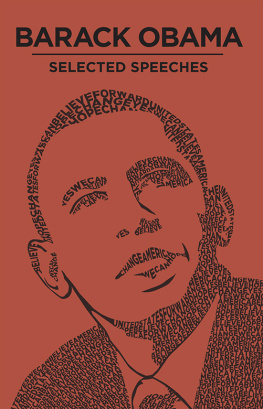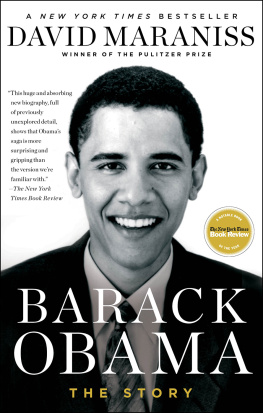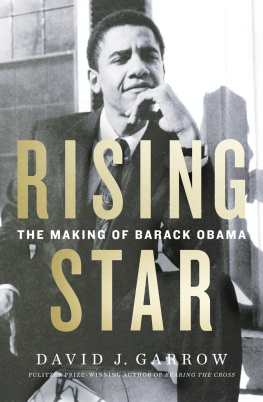BEATRICE GORMLEY has written a number of books for young readers, including several titles in the Childhood of Famous Americans and Childhood of World Figures series, as well as biographies of George W. Bush, Laura Bush, and Barack Obama. She lives in Westport, Massachusetts.
ALADDIN
Simon & Schuster, New York
Visit us at KIDS.SimonandSchuster.com
authors.simonandschuster.com/Beatrice-Gormley
To my husband, Bob
CONTENTS
CHAPTER 1
BARACK OBAMA JR.
ON AUGUST 4, 1961, A baby boy was born at kapiolani Medical Center in Honolulu, Hawaii. He weighed eight pounds, two ounces. His parents, Ann and Barack, named him after his father, Barack Hussein Obama, but they called their child Barry.
Barack Obama Sr. was a foreign exchange student from Kenya, a country in east-central Africa. He was twenty-five years old, studying on a scholarship at the University of Hawaii. He was the very first African student at the school.
Barack was tall and charming, with a voice like black velvet, as his mother-in-law Madelyn Dunham described it, with a British accent. He had come from a poor family, herding goats as a boy. His father, of the Luo tribe, had been a domestic servant for the British colonials. Now Kenya was on the brink of gaining independence from Britain.
Barack was determined to accomplish great things, both for himself and for his country. It was a great honor for a youth from his humble background to study at American schools and earn an advanced degree in economics. But he also had a heavy responsibility to his people, and he intended to return to Kenya and help lead the country into a brighter future.
Ann Dunham was an eighteen-year-old freshman at the University of Hawaii in 1960 when she met Barack in a Russian class. A quiet but independent-minded girl, she had dark curly hair and dark eyebrows like her fathers. She read serious books about reforming society, and she eagerly spent hours in long, earnest discussions with her friends.
Ann lived with her parents, Stanley and Madelyn Dunham, in a rambling house near the university campus. Stanley was a furniture salesman, while Madelyn worked for a bank. Both Stanley and Madelyn had grown up in Kansas, but after they married, they lived in several states before settling in Hawaii.
When Ann first brought Barack home for dinner, her parents, especially Madelyn, were uneasy. They had never met anyone from Africa before. But Barack quickly won them over with his charm, and they were impressed with his brilliant mind and his confidence.
However, the Dunhams were unpleasantly surprised in February 1961, when Ann and Barack eloped to the island of Maui and came back married. Stanley and Madelyn were disappointed that Ann, so bright and inquisitive of mind, was dropping out of college after only one semester. Madelyn also feared that the cultural differences between their American daughter and this African young man were too great.
Baracks father, Hussein Onyango Obama, who lived in Kenya, was also surprised and very upset at the news. He threatened to get Baracks travel visa canceled, so hed have to return to Kenya. He pointed out that Barack already had family responsibilities: a wife and two children in Kenya. Also, he warned his son, an American wife wasnt likely to be understanding about the Kenyan custom of a man having more than one family. Furthermore, Onyango wrote Stanley Dunham a long, angry letter. As Barrys mother told him years later, Baracks father didnt want the Obama blood sullied by a white woman.
Barack refused to obey his father, and the Dunhams accepted their daughters choice. For two years Barack and Ann lived with their baby in a small white house near the university campus. Then in 1963, Barack graduated from the University of Hawaii and won a scholarship to study economics at Harvard University in Massachusetts. The scholarship didnt allow enough money to bring Ann and their son with him, but Barack felt he couldnt pass up the chance to study at such a prestigious university. In the end, he left Hawaii for Massachusetts by himself.
Barack Sr. intended to eventually take his wife and son back to Kenya, after he had earned his PhD in economics. But Ann decided that this marriage would not work. Barack might love her and Barry, but his wife and son were not as important as his fierce ambition or his commitment to Kenya. Besides, it did matter to Ann, as Baracks father had predicted, that Barack had a wife and children in Kenya. In January 1964, she filed for divorce.
During his first years, Barry didnt wonder why his father was missing. Family pictures show him happily riding his tricycle or perched on a fence with his mothers arm around him. In another picture from those days, Barry frolics in the surf with his grandfather Stanley (whom Barry called Gramps). A boisterous, outgoing man, Stanley was delighted to have Barry to play with and show off to friends and neighbors. Madelyn Dunham was more practical and sensible, but she too doted on their grandson. She told him to call her Tutu, Hawaiian for grandmother, and the name got shortened to Toot.
Barrys mother and grandparents talked to him about his father, but they never criticized Barack Sr. to Barry. Ann especially must have felt pain and anger over the failed marriage, but she didnt say anything to Barry about that. The worst thing she said about Barack Obama was that he was a terrible driver.
Ann told Barry that he had a wonderful fatherfiercely intelligent, with a deep baritone voice and a way of commanding peoples attention. She showed him pictures of Barack Sr., a dark-skinned man with glasses. She told him his father loved him very much.
Although Barry wouldnt realize it for many years, his mother was just as remarkable as his father. Her full name was Stanley Ann Dunham, because her father had wished for a son. Growing up, she didnt like having a boys name, but feeling different from other children may have made her more independent as well.
Once, when the Dunhams were living in Texas, Ann brought a black friend home to play. That would have been fine with Anns parents, but the neighborhood children taunted the girls with racial slurs, driving the black girl away. Even more disturbing, the adult townspeople blamed the incident on the Dunhams. Instead of scolding their own children, they advised the Dunhams not to let Ann associate with black playmates.
When Ann was in the eighth grade, the family moved to Seattle, Washington. Stanley was offered a better job in a furniture store there, and they were all glad to leave Texas. Madelyn found a job in a bank. In 1956, the Dunhams bought a house on Mercer Island, near Seattle, so that Ann could attend the new high school there.
Ann was an idealistic and curious girl, with a mind of her own. Some of her high school friends were surprised that she didnt feel any need to fit in with other young people. She didnt seem to have the usual interest in dating or eventually getting married and having children.
What did interest Ann were current events and the controversial ideas set forth by her English and philosophy teachers. These teachers angered many in the community by questioning religion, the U.S. political system, and other parts of the American way of life. Some of the thought-provoking books they assigned were Vance Packards The Hidden Persuaders , about the power of advertising; George Orwells 1984 , a novel about a grim future in which the countries of the world are always at war and the government controls citizens minds with lies and violence; and William Whytes The Organization Man , which described big American corporations as controlling every aspect of their employees lives.





